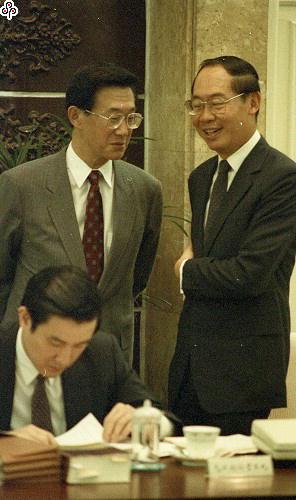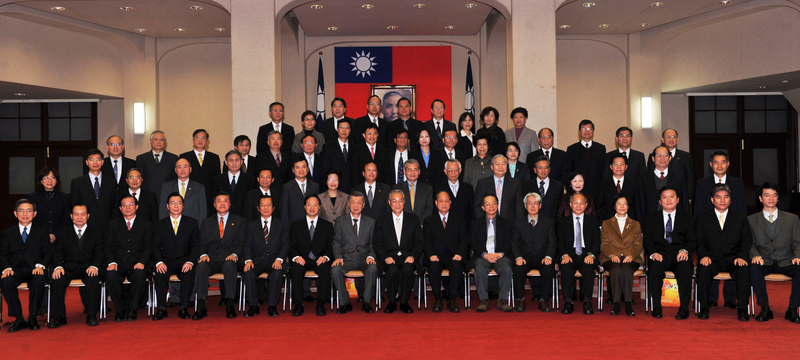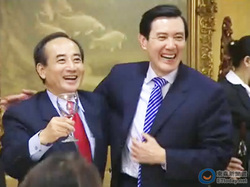| The Ma-Wang standoff from last year has several non-obvious lessons. I've focused on four:
If you buy the first three lessons, then the fourth is a straightforward consequence: a lot of the trouble Ma has run into with the legislature could have been avoided had he taken a different approach. Ma's strategy in his second term has been to use the party chairmanship to try to browbeat the KMT's legislators into approving his administration's policy initiatives, none more prominent than the Cross-Strait Services in Trade Agreement (CSSTA). This approach, I think it's fair to say now, has failed. What's more interesting to consider is why. And I think a big part of the answer lies in Ma's previous political experience. |
Over his 30+ year political career, Ma Ying-jeou has had zero legislative experience. Ma got his start in politics during the martial law era as an aide in the presidential office and English interpreter to Chiang Ching-kuo. Since then, his entire career has been in executive offices of one kind or another: deputy secretary-general of the KMT, director of the cabinet-level Research, Development, and Evaluation Commission, chair of the Mainland Affairs Council (see photo above), and finally as Minister of Justice (1993-96) under Lee Teng-hui. From there, he went on to serve two terms as mayor of Taipei (1998-2006), became chairman of the KMT in 2005, and then started preparing his campaign for president as soon as he left the mayor's office. In none of those positions did he have much day-to-day interaction with legislators, or ever have to negotiate with them on equal terms.
Of Laws and Sausages
Why might this matter? On the one hand, there are good reasons for appointing people who, you know, actually know something about the issues their ministries oversee (unlike, say, the infamous W.H. Smith of H.M.S. Pinafore fame). And I don't think anyone can fairly criticize the credentials of most of Ma's appointees--most of them hold advanced degrees, doctorates even, in their respective fields, and either have many years experience in the bureaucracies that they now oversee or held prestigious academic positions before joining the cabinet.
On the other, the lack of any cabinet ministers or close aides with legislative experience is a striking illustration of just how much Taiwan's government officials and elected legislators inhabit separate worlds. For comparison, it would be highly unusual in the U.S. not to include any former members of Congress in the presidential cabinet or other key positions. The current Obama administration cabinet, for instance, includes the former senators John Kerry as Secretary of State, and before him, Hillary Clinton; Chuck Hagel as Secretary of Defense; Joe Biden as Vice President; and of course President Obama himself, who served four years as a senator from Illinois. Obama also plucked his first chief of staff, Rahm Emanuel, straight from the Democratic leadership in the House of Representatives, giving him someone with a deep understanding of Congress and considerable contacts and influence there. Emanuel subsequently played a central role shepherding Obama's major policy initiatives through Congress, including health care reform, the stimulus package, and financial regulation.
Over the last two years, I think Ma could have used some people like Rahm Emanuel around: people who actually have personal experience in the "sausage factory" that is lawmaking in most legislatures. If there were, they might have convinced Ma to change his strategy for signing and passing cross-Strait agreements.
| For instance, after ECFA was approved by the LY, setting the ground rules for subsequent cross-Strait agreements, the legislature was all but shut out of a formal role in negotiations with the PRC, which have been conducted by the semi-official Straits Exchange Foundation rather than the cabinet-level Mainland Affairs Council or the Office of Trade Negotiations under the Ministry of Economic Affairs, both of which are subject to legislative oversight. |
In hindsight, that looks like a major strategic error on Ma's part. One might argue that it's a good thing legislators can't get their hands on trade negotiations and try to insert all kinds of special provisions to protect their favorite industries. But I think it's clear by now that Ma didn't help his government's case by keeping the entire legislature in the dark about the CSSTA, even the president's nominal allies.
Aides with legislative experience might also have talked Ma out of his attempt to expel Wang Jin-pyng from the legislature last September. They might have made the case to Ma that I've made in the previous posts: that the KMT caucus was his chief problem, rather than Wang or the DPP, and that he needed to focus his government's outreach on the caucus rather than attempt to take Wang out of the picture.
Lawmakers and Executives: Competing Worldviews
Perhaps the most important implication of the Ma-Wang battle from last year is that there's a power shift in Taiwan politics, and it's not going very smoothly. The Legislative Yuan is now indispensable to policy-making in a way that it's never been before. Yet much of the executive branch still wants to act like the old days, when the president and his close advisors set policy and bureaucrats had wide latitude to execute as they saw fit. That model was breaking down even in the 1990s, and under divided government during the Chen years, it all but ceased to exist. But a significant part of the bureaucracy and the KMT leadership appeared to expect Ma's election to bring a return to the old days of legislative deference to executive priorities. It hasn't played out that way. And it's taking the executive branch, and most importantly Ma, a long time to realize things have fundamentally changed even when the KMT has a one-party majority in the Legislative Yuan.
I'd like to end with something Frozen Garlic posted about a year ago. At the end of a long and prescient post, he suggested that executives and legislators in Taiwan have fundamentally different world views:
Presidents in many countries view the legislature as corrupt and parochial. Legislators, they think, are elected by special interests and depend on clientelism, factions, vote-buying, pork, locally influential extremists, and demagoguery to win their seats. How can they represent the people? In contrast, the president is elected by all the people in an election with a much stronger focus on issues that the people care about. The executive branch presents policies that balance the needs of all the people. When the special interests based in the legislature use their influence to emasculate the president’s policies, this is a travesty. Democracy is subverted!
Legislators, of course, see the world in very different terms. They are on the front lines and understand how people at the grassroots feel much better than the distant and imperious president. If anything, the collective popular mandate of the legislature is greater than that of the president since they collectively represent a far more diverse set of interests than the president. The democratic system requires them to examine executive bills carefully and consider the potential adverse impacts on their constituents. Of course the legislature modifies and rejects executive bills: democracy demands it!



 RSS Feed
RSS Feed
